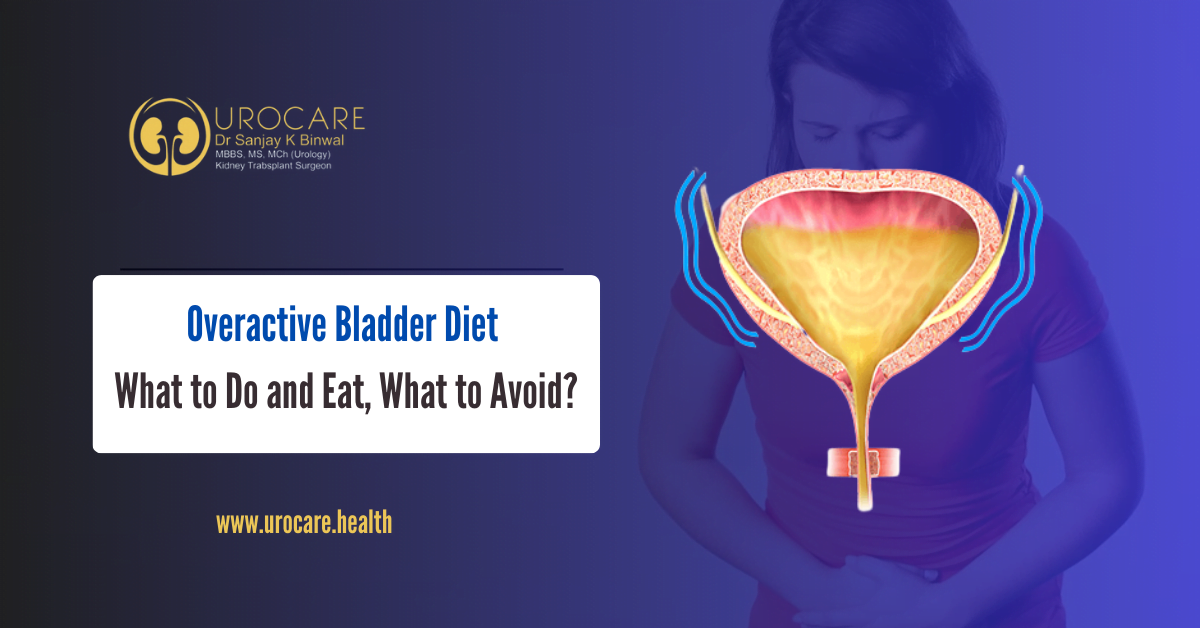
Overactive Bladder Diet – What to Eat, What to Avoid?
Overactive Bladder Diet: Living with an overactive bladder can be challenging and emotionally taxing. The frequent and often uncontrollable urge to urinate can disrupt daily life, causing anxiety and discomfort. However, there’s hope for those dealing with this concern to consider diet as one aspect that can significantly improve the condition is adopting a carefully curated diet.
In this blog, we will explore about “Overactive Bladder Diet” We’ll delve into what to eat, and what to avoid. Keep on reading to know about it in detail!
Overactive Bladder Diet – What to Eat
In this section we will help you to know about the diet that you can consider:
1. Stay Hydrated, but in Moderation:
Dehydration can irritate the bladder lining, worsening OAB symptoms. However, excessive fluid intake can lead to more frequent urination. Balance is key. Aim for 6-8 cups (48-64 ounces) of water daily and spread your intake throughout the day.
2. Limit Caffeine and Alcohol:
Caffeine and alcohol can be bladder irritants, increasing urgency and frequency. Consider reducing or eliminating these substances from your diet. Opt for caffeine-free alternatives and non-alcoholic beverages.
3. Watch Your Citrus Intake:
Citrus fruits and juices, such as oranges, grapefruits, and lemons, contain acids that can irritate the bladder. Moderation is crucial, so try to limit your consumption of these acidic foods.
4. Avoid Spicy and Acidic Foods:
Spicy foods, tomatoes, and tomato-based products can trigger OAB symptoms due to their acidic nature. Opt for milder options and explore low-acid or tomato-free alternatives for your favorite dishes.
5. Incorporate Fiber-Rich Foods:
Constipation can exacerbate OAB symptoms by putting pressure on the bladder. Include fiber-rich foods like whole grains, fruits, vegetables, and legumes in your diet to maintain regular bowel movements.
5. Choose Bladder-Friendly Proteins:
Some sources of protein, such as spicy meats, can irritate the bladder. Opt for lean protein sources like poultry, fish, tofu, and beans to minimize potential irritants.
6. Experiment with Bladder-Soothing Foods:
Certain foods may have a calming effect on the bladder. These include:
- Pumpkin seeds: Rich in magnesium and antioxidants, they may help improve bladder function.
- Bananas: Their potassium content may reduce muscle spasms in the bladder.
- Honey: Known for its soothing properties, honey may help ease irritation.
Male Urinary Incontinence: Causes, Symptoms, and Treatment Options
Overactive Bladder Diet – Things To Avoid With
There are several things that are a must to avoid with an overactive bladder:
1. Avoid Ignoring Your Symptoms:
Understanding your body’s signals is crucial when living with OAB. Ignoring the urge to urinate can lead to leakage, accidents, and even embarrassment. To prevent this, pay close attention to your body’s signals and respond promptly. By acknowledging your symptoms, you can better manage OAB and reduce its impact on your daily life.
2. Avoid Isolation and Silence:
OAB can sometimes make you feel isolated and hesitant to discuss your condition. However, keeping silent can exacerbate feelings of loneliness and anxiety. Instead, open up to trusted friends, family, or healthcare professionals about your OAB. They can provide support, understanding, and guidance, helping you feel less alone in your journey.
3. Avoid Excessive Caffeine and Alcohol:
Both caffeine and alcohol can irritate the bladder and worsen OAB symptoms. While it’s essential to enjoy life, moderating your intake of these substances can make a significant difference in managing OAB. Opt for decaffeinated beverages or explore non-alcoholic alternatives to minimize irritation and discomfort.
4. Avoid Stress and Anxiety Triggers:
Stress and anxiety can exacerbate OAB symptoms. To maintain emotional well-being, identify and manage your stressors. This may include practicing relaxation techniques such as deep breathing, mindfulness, or yoga. Reducing stress can help calm your bladder and improve your overall quality of life.
5. Avoid Limiting Activities:
It’s common for individuals with OAB to limit their activities due to fear of accidents or embarrassment. However, this can lead to a reduced quality of life. Instead, seek solutions that allow you to engage in activities you enjoy. This might involve wearing protective garments or planning your outings strategically to accommodate restroom breaks.
How Smoking Increases The Risk Of Bladder Cancer?
Reach Dr. Sanjay K Binwal for Overactive Bladder Treatment!
Are you tired of constantly battling with the discomfort of an overactive bladder? It’s time to take control of your life and seek the expertise of Dr. Sanjay K Binwal, a compassionate and highly skilled urologist in Jaipur.
He not only brings a wealth of medical knowledge and experience to the table but also a deep understanding of the emotional toll that conditions like overactive bladder can take on individuals. He knows that living with such a condition can be both physically and mentally challenging, often affecting one’s quality of life!
